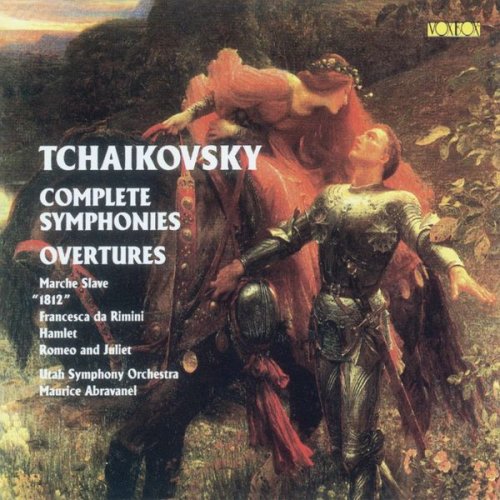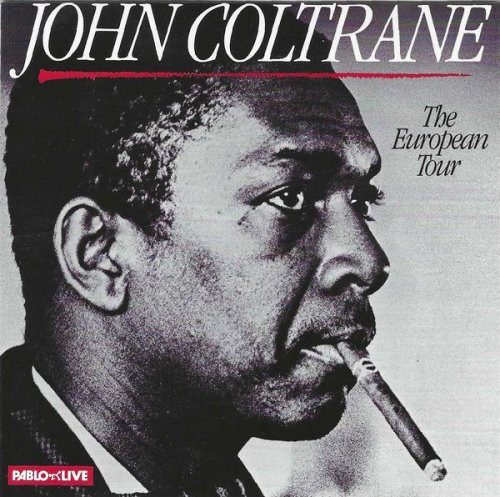Utah Symphony Orchestra & Maurice Abravanel - Tchaikovsky: Overtures & Complete Symphonies (2001)

Artist: Utah Symphony Orchestra, Maurice Abravanel
Title: Tchaikovsky: Overtures & Complete Symphonies
Year Of Release: 2001
Label: Vox Box
Genre: Classical
Quality: FLAC (tracks + booklet)
Total Time: 6:30:52
Total Size: 1.68 GB
WebSite: Album Preview
Tracklist:Title: Tchaikovsky: Overtures & Complete Symphonies
Year Of Release: 2001
Label: Vox Box
Genre: Classical
Quality: FLAC (tracks + booklet)
Total Time: 6:30:52
Total Size: 1.68 GB
WebSite: Album Preview
Disc 1
1. Utah Symphony & Maurice Abravanel – Symphony No. 2 in C Minor, Op. 17, TH 25 "Little Russian": I. Andante sostenuto - Allegro vivo (11:11)
2. Utah Symphony & Maurice Abravanel – Symphony No. 2 in C Minor, Op. 17, TH 25 "Little Russian": II. Andantino marziale (06:40)
3. Utah Symphony & Maurice Abravanel – Symphony No. 2 in C Minor, Op. 17, TH 25 "Little Russian": III. Allegro molto vivace (05:22)
4. Utah Symphony & Maurice Abravanel – Symphony No. 2 in C Minor, Op. 17, TH 25 "Little Russian": IV. Moderato assai (09:48)
5. Utah Symphony & Maurice Abravanel – Symphony No. 5 in E Minor, Op. 64, TH 29: I. Andante - Allegro con anima (14:28)
6. Utah Symphony & Maurice Abravanel – Symphony No. 5 in E Minor, Op. 64, TH 29: II. Andante cantabile, con alcuna licenza (12:41)
7. Utah Symphony & Maurice Abravanel – Symphony No. 5 in E Minor, Op. 64, TH 29: III. Valse. Allegro moderato (06:21)
8. Utah Symphony & Maurice Abravanel – Symphony No. 5 in E Minor, Op. 64, TH 29: IV. Andante maestoso - Allegro vivace (12:24)
Disc 2
1. Utah Symphony & Maurice Abravanel – Manfred Symphony in B Minor, Op. 58, TH 28: I. Lento lugubre - Moderato con moto - Andante (15:04)
2. Utah Symphony & Maurice Abravanel – Manfred Symphony in B Minor, Op. 58, TH 28: II. Vivace con spirito (09:02)
3. Utah Symphony & Maurice Abravanel – Manfred Symphony in B Minor, Op. 58, TH 28: III. Andante con moto (10:25)
4. Utah Symphony & Maurice Abravanel – Manfred Symphony in B Minor, Op. 58, TH 28: IV. Allegro con fuoco (18:12)
5. Utah Symphony & Maurice Abravanel – Marche slav, Op. 31, TH 45 (09:59)
6. Utah Symphony & Maurice Abravanel – 1812 Overture, Op. 49, TH 49 (15:48)
Disc 3
1. Utah Symphony & Maurice Abravanel – Symphony No. 6 in B Minor, Op. 74, TH 30 "Pathétique": I. Adagio - Allegro non troppo (18:18)
2. Utah Symphony & Maurice Abravanel – Symphony No. 6 in B Minor, Op. 74, TH 30 "Pathétique": II. Allegro con gracia (08:14)
3. Utah Symphony & Maurice Abravanel – Symphony No. 6 in B Minor, Op. 74, TH 30 "Pathétique": III. Allegro molto vivace (09:11)
4. Utah Symphony & Maurice Abravanel – Symphony No. 6 in B Minor, Op. 74, TH 30 "Pathétique": IV. Finale. Adagio lamentoso (09:12)
5. Utah Symphony & Maurice Abravanel – Symphony No. 1 in G Minor, Op. 13, TH 24 "Winter Daydreams": I. Allegro tranquillo (12:05)
6. Utah Symphony & Maurice Abravanel – Symphony No. 1 in G Minor, Op. 13, TH 24 "Winter Daydreams": II. Adagio cantabile ma non troppo (10:26)
7. Utah Symphony & Maurice Abravanel – Symphony No. 1 in G Minor, Op. 13, TH 24 "Winter Daydreams": III. Allegro scherzando giocoso (07:03)
Disc 4
1. Utah Symphony & Maurice Abravanel – Symphony No. 1 in G Minor, Op. 13, TH 24 "Winter Daydreams": IV. Andante lugubre - Allegro maestoso (11:47)
2. Utah Symphony & Maurice Abravanel – Symphony No. 3 in D Major, Op. 29, TH 26 "Polish": I. Moderato assai - Allegro brillante (12:31)
3. Utah Symphony & Maurice Abravanel – Symphony No. 3 in D Major, Op. 29, TH 26 "Polish": II. Allegro moderato e semplice (06:13)
4. Utah Symphony & Maurice Abravanel – Symphony No. 3 in D Major, Op. 29, TH 26 "Polish": III. Andante elegiaco (09:37)
5. Utah Symphony & Maurice Abravanel – Symphony No. 3 in D Major, Op. 29, TH 26 "Polish": IV. Scherzo (05:40)
6. Utah Symphony & Maurice Abravanel – Symphony No. 3 in D Major, Op. 29, TH 26 "Polish": V. Allegro con fuoco (09:12)
7. Utah Symphony & Maurice Abravanel – Francesca da Rimini, Op. 32, TH 46 (24:53)
Disc 5
1. Utah Symphony & Maurice Abravanel – Symphony No. 4 in F Minor, Op. 36, TH 27: I. Andante sostenuto (18:12)
2. Utah Symphony & Maurice Abravanel – Symphony No. 4 in F Minor, Op. 36, TH 27: II. Andantino in modo di canzona (08:51)
3. Utah Symphony & Maurice Abravanel – Symphony No. 4 in F Minor, Op. 36, TH 27: III. Scherzo. Pizzicato ostinato (05:37)
4. Utah Symphony & Maurice Abravanel – Symphony No. 4 in F Minor, Op. 36, TH 27: IV. Allegro con fuoco (08:49)
5. Utah Symphony & Maurice Abravanel – Hamlet Overture, Op. 67, TH 53 (17:35)
6. Utah Symphony & Maurice Abravanel – Romeo & Juliet Fantasy Overture, TH 42 (1880 Version) (19:45)
The state of Utah became a flourishing classical music scene thanks to the efforts of Maurice Abravanel, who served as music director of the Utah Symphony for 32 years starting in 1947. Although his peers might have looked at a posting in Utah as death in the boondocks, to Abravanel it was an opportunity to accomplish his dream of building up a permanent symphony orchestra of his own in a part of the world that was sorely lacking such a resource. Doing this meant turning down a lucrative contract with Radio City Music Hall, and even working without pay during the orchestra's most extreme periods of financial struggle.
Born of Spanish and Portuguese parents (and a descendant of Queen Isabella of Spain), Abravanel spent his early years in Switzerland. He studied in Germany under Kurt Weill, who was a major influence both technically and philosophically. Abravanel conducted an orchestra for the first time as a teenager in Switzerland, and his abilities soon put him in front of the orchestras of the Berlin State Opera and the Paris Opera. He went to Australia for several years, the first indication of his dedication toward hands-on musical involvement outside the geographical mainstream. When he was 33 he was hired as the youngest conductor of the Metropolitan Opera in New York City. He took on an incredibly busy schedule, at one point conducting seven performances of five different operas over a period of nine days. While in the Big Apple, he shifted his talents to Broadway, renewing his relationship with Weill to become the conductor of all of the composer's American productions.
A few years later came the first one-year contract to conduct the nearly amateurish Utah Symphony. The Western scenery may have balanced out the sour notes, however, and Abravanel decided to stay put. He retired from the orchestra in 1979, but he remained active in Utah's cultural community, as well as internationally, until his death. Under his guidance, the Utah Symphony developed a superb international reputation, which Abravanel accomplished not by importing players from outside the area, but by working diligently with the local musicians in order to turn them into more than competent full-time players. The symphony made four world tours and recorded with Vanguard, Vox, Angel, and CBS. Abravanel is the only conductor to have recorded the entire Mahler symphonic output with the same orchestra. He also championed contemporary music, programming compositions by Edgard Varèse as well as Utah composers such as Leroy Robertson and Crawford Gates.
Other Abravanel activities outside of Mormon territory included directing the Music Academy of the West in Santa Barbara, CA, from 1956 through 1979. In 1981 he was appointed an artist-in-residence for life at Tanglewood. He served on the National Council of the Arts from 1970 through 1976, and received the American Symphony Orchestra League's Golden Baton Award in 1981. In 1970, he became a member of the first music panel of the National Endowment for the Arts. He received a Tony Award for Regina and Grammy nominations for some of the more than 100 recordings with the Utah Symphony, many of which are considered classics. ~ Eugene Chadbourne
Born of Spanish and Portuguese parents (and a descendant of Queen Isabella of Spain), Abravanel spent his early years in Switzerland. He studied in Germany under Kurt Weill, who was a major influence both technically and philosophically. Abravanel conducted an orchestra for the first time as a teenager in Switzerland, and his abilities soon put him in front of the orchestras of the Berlin State Opera and the Paris Opera. He went to Australia for several years, the first indication of his dedication toward hands-on musical involvement outside the geographical mainstream. When he was 33 he was hired as the youngest conductor of the Metropolitan Opera in New York City. He took on an incredibly busy schedule, at one point conducting seven performances of five different operas over a period of nine days. While in the Big Apple, he shifted his talents to Broadway, renewing his relationship with Weill to become the conductor of all of the composer's American productions.
A few years later came the first one-year contract to conduct the nearly amateurish Utah Symphony. The Western scenery may have balanced out the sour notes, however, and Abravanel decided to stay put. He retired from the orchestra in 1979, but he remained active in Utah's cultural community, as well as internationally, until his death. Under his guidance, the Utah Symphony developed a superb international reputation, which Abravanel accomplished not by importing players from outside the area, but by working diligently with the local musicians in order to turn them into more than competent full-time players. The symphony made four world tours and recorded with Vanguard, Vox, Angel, and CBS. Abravanel is the only conductor to have recorded the entire Mahler symphonic output with the same orchestra. He also championed contemporary music, programming compositions by Edgard Varèse as well as Utah composers such as Leroy Robertson and Crawford Gates.
Other Abravanel activities outside of Mormon territory included directing the Music Academy of the West in Santa Barbara, CA, from 1956 through 1979. In 1981 he was appointed an artist-in-residence for life at Tanglewood. He served on the National Council of the Arts from 1970 through 1976, and received the American Symphony Orchestra League's Golden Baton Award in 1981. In 1970, he became a member of the first music panel of the National Endowment for the Arts. He received a Tony Award for Regina and Grammy nominations for some of the more than 100 recordings with the Utah Symphony, many of which are considered classics. ~ Eugene Chadbourne

![Machito and His Orchestra - Irving Berlin in Latin America (Remastered Edition 2025) [Hi-Res] Machito and His Orchestra - Irving Berlin in Latin America (Remastered Edition 2025) [Hi-Res]](https://www.dibpic.com/uploads/posts/2025-12/1765784965_moib.jpg)






